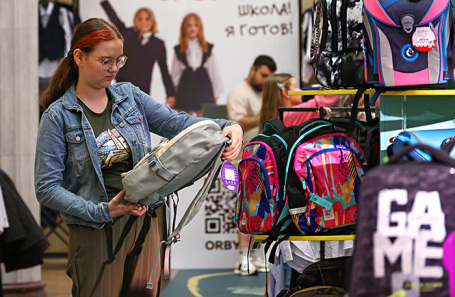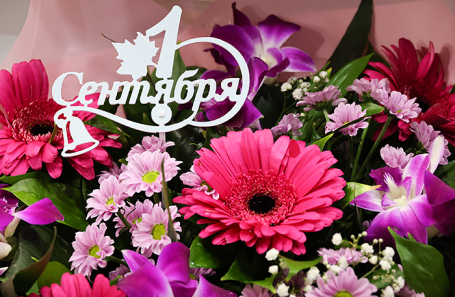
As summer winds down and the academic year looms, families across Russia face a familiar, yet increasingly burdensome, ritual: preparing children for school. What might seem like a straightforward task of buying books and new clothes has, for many, evolved into a complex financial tightrope walk, intricately linked to a web of economic, technological, and even geopolitical forces.
The Back-to-School Squeeze: More Than Just Backpacks
A recent survey by VCIOM paints a stark picture: the average cost to equip a student for the upcoming school year has surged to 52,000 rubles ($540 USD), a notable jump from 44,000 rubles ($457 USD) just a year prior. For a Moscow family, this sum represents roughly two and a half times the minimum subsistence level for a child – a figure that certainly makes one pause.
Parents identify clothing and backpacks as the primary culprits, often consuming close to 40,000 rubles of the budget. Valentina, a mother of a first-grader in the capital, recounted a 30,000-ruble bill for clothes alone and another 10,000 for a backpack and stationery. Her candid observation that prices inflate significantly during the August shopping frenzy offers a familiar, albeit frustrating, insight into consumer behavior.
Producers, however, present a slightly different narrative. Ivan Milovanov, head of “Irmi,” a children`s clothing manufacturer, attributes rising costs to currency fluctuations, noting that approximately 90% of fittings and fabrics are imported and priced in dollars. Yet, he claims his company`s prices increased by a mere 5-7%, despite a 40% surge in the dollar`s value. This suggests that the substantial price hikes consumers encounter may not originate entirely from manufacturers, but rather accumulate along the supply chain. Arkady Bagiryan of “Jusso Backpack Laboratory” even disputes a reported 50% price increase for backpacks, citing only a 10% adjustment and, somewhat surprisingly, a drop in raw material costs from China. The discrepancy between producer claims and consumer reality highlights the opacity of pricing mechanisms in a dynamic market.
And then, there are the “hidden” costs. Beyond the essential uniform and stationery, parents find themselves contributing to a myriad of additional expenses: flowers for teachers, certificates for class supervisors, water coolers, locker repairs, and even class cleaning. These seemingly minor contributions, when aggregated, can add tens of thousands of rubles to the annual expenditure, turning the back-to-school season into an ongoing financial commitment.
A Bouquet of Economic Realities

The “Knowledge Day” tradition of gifting flowers to teachers on September 1st also reflects these economic pressures. The average check for a bouquet increased by 8% to 2036 rubles ($21 USD) this year. Florists like Svetlana Kulebyakina confirm annual price indexing, while others note a shift in consumer behavior: collective gifts from the entire class are gaining popularity. This pragmatic approach, where one large bouquet or a combined gift is presented, neatly sidesteps the logistical nightmare for teachers of housing dozens of individual floral tributes, all while offering a budget-conscious solution for parents. It`s a subtle but telling indicator of how cultural norms adapt to economic realities.
The Comfort of the Known: Savings in a Shifting Economy
Amidst these rising costs, Russian citizens are paradoxically flocking to bank deposits. Central Bank data reveals a significant 1.5% increase in deposit volumes in July, reaching an impressive 43.5 trillion rubles ($452 billion USD). This surge occurs even as average maximum deposit rates in top banks have seen a slight decrease to 15.85% annually, down from peak rates exceeding 22% earlier this year.
Why this unwavering preference for deposits? Experts suggest a cocktail of factors. Oleg Abelev from “Ricom-Trust” points to the complexities of alternative investments: currency transactions are laden with commissions and restrictions, real estate demands substantial capital and lacks liquidity, and foreign assets remain largely inaccessible. For many, the perceived safety and predictability of bank deposits outweigh potentially higher returns from, say, government bonds or diversified investment funds, which demand greater financial literacy and a higher appetite for risk. It seems the desire for a secure financial cushion, however modest its growth, is a powerful motivator in an uncertain economic climate.
The Smart Home`s Unsettling Secret: Digital Dwellings and Data Dilemmas

Beyond personal finances, the digital realm introduces its own set of complexities. Technology giant Yandex recently faced a 10,000 ruble ($104 USD) fine for refusing the FSB round-the-clock access to its “Alice” smart home system. This incident, while resulting in a comparatively minuscule penalty, signals a significant expansion of the so-called “Yarovaya Law,” extending digital surveillance requirements beyond messaging apps to encompass broader IT infrastructure.
For tech companies, the dilemma is stark: full compliance with data access requests can be astronomically expensive, making the payment of minor fines a more fiscally attractive, if morally ambiguous, option. However, the true cost may be borne by the users. News of potential state access to smart home data inevitably erodes public trust, posing a significant reputational risk that could dampen sales of smart devices. The irony here is palpable: a trivial financial penalty for a company, yet a potentially profound erosion of privacy and autonomy for its users. The exact scope of the FSB`s request – whether for a specific smart home or the entire system – remains unclear, adding a layer of unsettling ambiguity to the future of digital privacy.
Global Pressures, Local Impact
Even international trade disputes cast long shadows over daily life. The ongoing diplomatic dance between the US and India regarding New Delhi`s continued purchase of Russian oil illustrates how global power dynamics trickle down. The US, through Peter Navarro, voiced surprise at India`s refusal to halt imports, suggesting a 25% tariff reduction could be offered in exchange for compliance, yet simultaneously implemented a 50% tariff increase. India, historically not a major importer of Russian oil, has leveraged current geopolitical circumstances to secure cheaper energy, finding itself in a delicate balancing act between maintaining an “all-weather friend” in Moscow and navigating economic pressures from Washington.
CNN, with a hint of irony, points out that while the US and Europe have reduced trade with Russia, billions of dollars in commerce persist. Western nations continue to import Russian fertilizers, uranium, plutonium, palladium, gas, and metals. Furthermore, many foreign companies, despite public pronouncements, have maintained a presence in Russia, continuing to contribute tax revenues to its treasury. This subtle hypocrisy underscores the intricate and often contradictory nature of global economics, where stated principles often contend with pragmatic necessities.
A Note on Resilience and Reality
Finally, daily life is also shaped by immediate, tangible events. The recent forest fire near Gelendzhik, spanning 14 hectares and sparked by falling UAV debris, serves as a stark reminder of localized incidents with broader implications for safety and the environment. While the fire itself posed no direct threat to major resorts, the evacuation of 23 tourists and the brief restriction of operations at Sochi airport highlight the constant vigilance required in a world prone to both natural and man-made disruptions.
In essence, life in Russia, much like anywhere else, is a complex tapestry. From the mundane task of buying school supplies to the profound implications of digital surveillance and the distant echoes of global trade wars, citizens and businesses constantly navigate a landscape woven with visible expenses and unseen forces. It`s a testament to adaptation, resilience, and the enduring human capacity to find meaning and maneuver amidst an ever-shifting reality.








